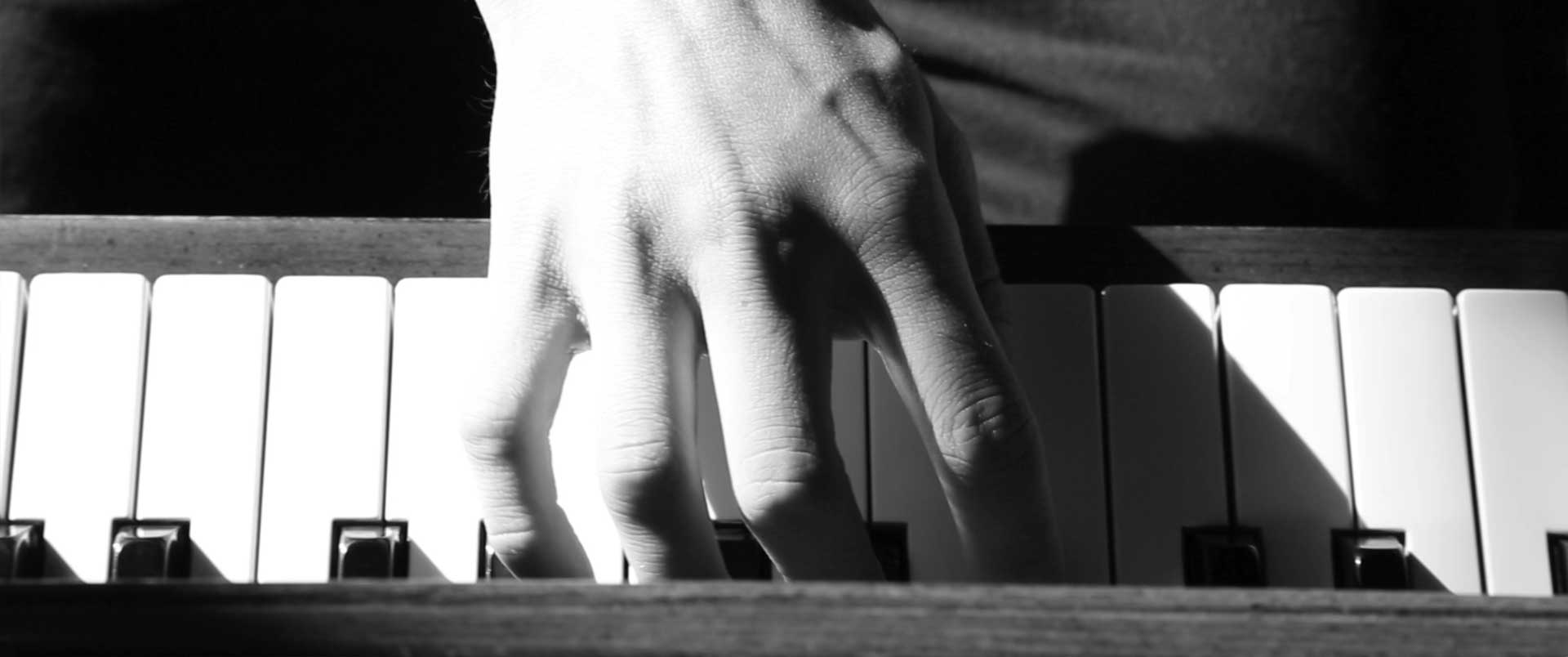Nearly every short film we create contains a musical score. The focus of each short is almost never on the music, but each film would simply fail to function without it. Many people don't notice the significance of the score, because if the music is doing its job properly, it won’t draw much attention to itself, but rather serve to enhance the story and characters.
After writing more than 80 musical cues for dozens of shorts under the Make-Believe Machines moniker, I’ve decided to take time to highlight five projects in which the music was especially significant. For each film, I’ve stripped out the dialogue and sound effects and rendered a music-only version, which you can watch to see how the score interacts with different moments in the story. (Clicking a film’s title will take you to the normally-mixed version.) Below each of these, I’ve written some commentary about the musical challenges each project posed and the decisions I made in response. Each musical cue is separately embedded alongside the commentary, so you can listen to them individually if you'd like.
Dramatic Score
This is my first score for a dramatic (non-comedy) film, and I really enjoyed working on it. There were three key pieces written for this film — one for the opening sequence, one for the credits, and the largest piece for the chase-centered bulk of the film. Note to Self is, in some ways, an action movie, but one with a tragic emotional core. The music needed to reflect both of these aspects — the main piece is centered around a rapid pizzicato rhythm that reflects and builds the tension and urgency of the story, while the chords played by the strings and organ emphasize the main character’s emotions. As the story intensifies and it becomes known that the female lead may be in danger, piano is added atop the pizzicato rhythm and distorted drums mark the beginning of each string swell.
Drones and ambient sounds were used to score the blackout after the main character is captured. I gradually layered and built those sounds to an abrupt cut when the character’s captor slams his fist on the table. I chose not to score the ending scene for a couple of reasons. Since the majority of the film is heavily music-driven, the sudden lack of score allows the audience to connect with the main character better in that moment. Everything he was feeling up until that point was a sense of panic, but having been captured, he realizes the game is over, and the 'villain' is now in control. The other reason for not scoring this scene was due to the actors’ performances being strong enough to carry it without any additional help. Much of what the interrogator says in this scene is cruel and terrifying enough as the actor (Arnie DeWitt III) performs it — adding ominous music on top of it might have propelled it into overdramatic territory and ruined that effect.
The opening piece was written after the central score, and it foreshadows the main piece by using the same pizzicato rhythm in its final seconds. The boxing montage scene was specifically written for use as an opportunity to musically set the tone of the film early on. I did this by mixing an ominous synth with mournful, distorted strings to ramp the film into the music-free robbery scene.
The credits piece was created by taking the pizzicato section of the opening piece and slowing its tempo down by 73%, then tweaking the highest notes to give it a more menacing feel, and overlaying a new, conclusive-feeling melody.
Comedy Score
Whistle Boys was conceived as an almost-silent film with only one word — “no” — ever spoken. As a result, it is heavily reliant on music to tell the story, and the entire short is scored, aside from a few seconds toward the end. Due to fast pacing, the music also has to make several hairpin turns, changing the mood very quickly.
The film begins with an aggressive cello piece for the patrol segment, then quickly shifts to an adventurous tone as the two main characters become friends and try to stop crime together. Around the midpoint, the two become closer, and the score shifts to an 80’s-themed romantic mood.
The party scene is paired with an electronic track by Cataluxx, which makes a gradual transition into a horror piece written by my collaborator, Rob Ogden, as the main character discovers his partner has betrayed him.
The final piece — used for the credits — is a somber cover of Flo Rida’s “Whistle” made in collaboration with Luke Pettipoole (The Envy Corps). Luke recorded a demo with his guitar and a flute, which he passed over to me for adjustments.
I removed the guitar and flute instrumental tracks and re-scored it with piano and strings to better match the music used for the rest of the film.
Commercial Score
For this short narrative advertisement, I wrote a piano-driven piece inspired by Philip Glass. As with the dramatic and comedy shorts I’ve scored, this involved a lot of precision to make the piece naturally evolve with the story. I worked closely with the editor (Paul David Benedict) to nail the timing for moments like the one at 1:07, where the character makes the decision to move from Chicago to Iowa.
Dark Comedy Score
The Evil Grin Gift Box shorts thrive on absurd dialogue, so I usually write the score to help ground the characters in a more conventional movie reality. The music is almost never goofy, as it is in some comedies, but this score is a bit of an exception. The central character of this short is obsessed with finding microaggressions — seemingly ordinary acts which, in the character's mind, are racist or sexist. As the short progresses, he begins to believe the college campus is swarming with an ever-growing number of racists, sexists, and fascists. He gradually becomes unhinged, and the score reflects this by slowly falling to pieces. Each of the main character's perceived threats is underlined with a comically ominous choral section, always returning to a steady bass rhythm that propels the dialogue-heavy plot forward. Roughly halfway through the piece, harsh, dissonant pizzicato strings begin stabbing through the mix, and the entire piece unravels in a series of guitar string scrapes and smashes.
The moment after the main character snaps, after which he brutally pummels a fellow student, is scored as straight horror segueing into tragedy.
Finally, the credits are scored with a heavier, more intense version of the "Macroaggressions" riff that carries most of the film.
Absurdist Comedy Score
Most of the time when I'm writing music for short films, the cues come out to be around 1-2 minutes in length and generally maintain the same mood for their entire runtime. Jeff & Jeff was a significant short for me scoring-wise, because it was the first larger piece of music I wrote for a short, and it needed to make four significant tonal shifts in that time. The concept behind the film was to comically run two characters through the full range of human emotions without ever connecting them to a tangible plot. Some of these emotional shifts are marked by abrupt location changes, and each of those needed to be reflected musically without breaking the continuity of the musical piece.
Because the short starts as a comedy sitcom gone wrong, Bearcubbin’s gleeful “Girls with Fun Haircuts” is used for the opening scene, followed by Ativin's drone track, "Endless", which launches us into the original score (starting at 1:10) that carries the rest of the short.
The original music is split into four sections that merge into one another: “The Field” covers the torn relationship between the two characters with a melancholy piano and cello piece. As the characters become more aggressive in their argument, I steered the music toward primal percussion, which is used during the stadium sequence.
As the two reconcile in the river, I transitioned the percussion piece into a polar-opposite string bed.
The last section combines the instruments from the three prior sections in a piece inspired by going-to-war music from medieval action movies. It all ends in a long, building sustained heap of strings over a time-lapse shot of the sun going down.
The film wraps up with an original song written by my friend, Bradford Johnson, and a credits track by Alpha Male Tea Party.
I hope you've enjoyed this look at the musical score for five short films. If you'd like to hear more of my music, including standalone pieces that were not written for film, check out the Make-Believe Machines website. If you're interested in hiring me to score your film or commercial, shoot me an email with information about your project.

